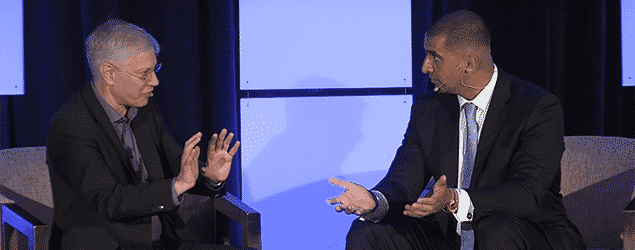Anniversary Chapters: Richard Ralston Discusses “Publishing Atlas Shrugged”

“The roots of my article ‘Publishing Atlas Shrugged’ — and similar articles in Robert Mayhew’s collections about the other Ayn Rand novels — are in my work supporting the promotion and marketing of books by Ayn Rand, first as a consulting advisor and more recently as publishing manager at the Ayn Rand Institute,” says Richard Ralston, one the contributors to Robert Mayhew’s Essays on Ayn Rand’s “Atlas Shrugged” whom we’re interviewing in celebration of the novel’s 60th anniversary.
“When this work began in 1993,” Ralston recalls, “I devoted a great deal of time to conversations with individuals having first-hand knowledge about the novel’s publication. I talked with her long-time friend and associate Leonard Peikoff, as well as editors and managers of the books at New American Library (now an imprint of Penguin Random House) who worked with Leonard and earlier directly with Ayn Rand, and Perry Knowlton, the CEO of Ayn Rand’s literary agency Curtis Brown, Ltd., who worked personally with Ayn Rand for many years. I also had the opportunity to meet with Gerald Pollinger, of the literary agency Pollinger Limited in London, who had been Ayn Rand’s British agent and whose father, Laurence Pollinger, had worked with her closely in the 1930s and 1940s as British agent for Anthem, We the Living, and The Fountainhead.
“These conversations yielded a wealth of evidence that Ayn Rand was intimately involved with every aspect of successfully publishing her books. While writing her novels and after completing each one, she was ‘hands on’ in every aspect of the presentations by her agents to prospective publishers and the publication, advertising, and other promotion of her novels, to ensure that they reached her readers.
“When I learned that Robert Mayhew was preparing the first of his collections, Essays on Ayn Rand’s “Anthem,” I recognized the need to communicate how Ayn Rand’s approach to the business of publishing her books was both unique and interesting. My research had originally been for the purpose of becoming knowledgeable about the history in order to promote the books more effectively, but I now realized it would also be interesting to others, and proposed my chapters on publishing the novels to Robert.
“Unlike Ayn Rand’s experience with her first three novels — all of which presented challenges in finding and managing the efforts of literary agents who struggled to secure a publisher — Atlas Shrugged met with a welcome reversal, in that the major publishers came to her. She prepared a list of ‘Qualifications of Ideal Publisher’ by which she would evaluate each:
1. Understanding of the nature of the book.
2. Understanding of the nature of the book’s appeal.
3. Ability to sell the book aggressively and properly.
4. Independence of judgment, which would withstand influence when under fire.
5. Enthusiasm: a. for job of publishing. b. for me specifically.
6. Rationality in method of approach to issues and to communication with me.
“After years of listening to agents and publishers judging her work, she had now reached a position to judge their qualifications to publish her work.
“What I enjoyed most about Ayn Rand’s hands-on approach was the value she placed on finding ‘my kind of readers’ and her fundamental confidence that ‘word of mouth’ promotion by these readers would be the most solid basis for increasing readership of Atlas Shrugged and her other books. That proved to be the case. Thus far, more than 9 million copies of Atlas Shrugged have been manufactured and distributed to this readership.”
If you’re intrigued by these perspectives, Essays on Ayn Rand’s “Atlas Shrugged” is available here, and more on Atlas Shrugged is available here.



